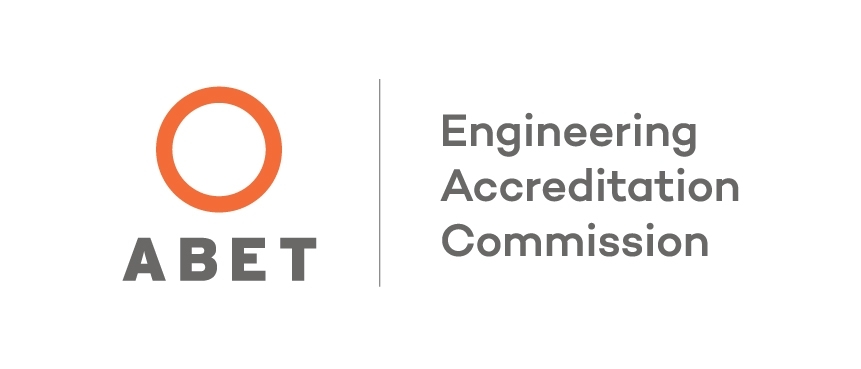ABET Accreditation

For more information, visit the ABET website Why Accreditation Matters
The School of Engineering’s baccalaureate programs in Biomedical, Computer, Electrical, Interdisciplinary, Mechanical, and Product Design and Manufacturing Engineering are accredited by the Engineering Accreditation Commission of ABET.
- The Biomedical Engineering Major is accredited under the General Criteria and the Bioengineering, Biomedical, and Similarly Named Engineering Programs Program Criteria by the Engineering Accreditation Commission of ABET, 415 N. Charles St., Baltimore, MD 21201. Telephone: (410) 347-7700, www.abet.org.
- The Computer Engineering Major is accredited under the General Criteria and the Electrical, Computer, Communications, Telecommunications(s) and Similarly Named Engineering Programs Program Criteria by the Engineering Accreditation Commission of ABET, 415 N. Charles St., Baltimore, MD 21201. Telephone: (410) 347-7700, www.abet.org.
- The Electrical Engineering Major is accredited under the General Criteria and Electrical, Computer, Communications, Telecommunications(s) and Similarly Named Engineering Programs Program Criteria by the Engineering Accreditation Commission of ABET, 415 N. Charles St., Baltimore, MD 21201. Telephone: (410) 347-7700, www.abet.org.
- The Interdisciplinary Engineering Major is accredited under the General Criteria and Engineering, General Engineering, Engineering Physics, Engineering Science, and Similarly Named Engineering Programs Program Criteria by the Engineering Accreditation Commission of ABET, 415 N. Charles St., Baltimore, MD 21201. Telephone (410) 347-7700, www.abet.org.
- The Mechanical Engineering Major is accredited under the General Criteria and Mechanical and Similarly Named Engineering Programs Program Criteria by the Engineering Accreditation Commission of ABET, 415 N. Charles St., Baltimore, MD 21201. Telephone: (410) 347-7700, www.abet.org.
- The Product Design and Manufacturing Engineering Major is accredited under the General Criteria and Manufacturing and Similarly Named Engineering Programs Program Criteria by the Engineering Accreditation Commission of ABET, 415 N. Charles St., Baltimore, MD 21201. Telephone (410) 347-7700, www.abet.org.
See the program objectives, student outcomes and enrollment history indicated below.
In January 2022, all six undergraduate engineering programs (Biomedical, Computer, Electrical, Interdisciplinary, Mechanical, and Product Design and Manufacturing Engineering) submitted a request for review (RFE), followed by the submission of the engineering self-study reports in July 2022. All six B.S.E degree programs noted above were reviewed by ABET in November 2022, which concluded in a positive exit meeting with the ABET team. In August 2023, the final statement from the ABET Engineering Accreditation Commission (EAC) indicated an approval for the reaccreditation of the Computer, Electrical, Interdisciplinary, Mechanical, and Product Design and Manufacturing Engineering programs and an initial accreditation for the Biomedical Engineering program.
For programs to maintain their accreditation, an ABET team, composed of university and industry volunteers, conducts an onsite campus re-evaluation visit of the programs every six years. The evaluation is a comprehensive process, which includes an exhaustive review of the program’s curriculum, processes (admission, assessment, continuous improvement, and graduation audit), faculty credentials/professional development, facilities, support units, and samples of student work. Programs must demonstrate achievement of their stated student outcomes. During the visit, the team conducts interviews with the faculty, staff students, support units, and the university-level administration, including the provost and president. The School of Engineering’s baccalaureate programs completed this process in November 2022.
The accreditation process requires a huge effort on the part of the university and the programs being evaluated, as well as the visiting team. ABET accreditation provides evidence that the School of Engineering programs have met standards essential to produce graduates that are ready to enter into the engineering profession, and that graduates from the program have a solid educational foundation, allowing them to become leaders in engineering innovation, emerging technologies, and public safety/welfare needs.
- For students, accreditation matters because it instills confidence in the education received—ABET accreditation is the trusted standard for employers worldwide.
- For Grand Valley State University and the School of Engineering programs, ABET accreditation demonstrates a commitment to delivering quality education.
- For industry, governmental units, and the world, ABET accreditation matters because employers can trust that graduates of ABET-accredited programs are properly prepared to enter the workforce.
More information on ABET and the accreditation process.
For information regarding the assessment and (or) accreditation process within the School of Engineering, please contact:
Diane LaFreniere
James R. Sebastian Chair
Engineering Education, Assessment/Accreditation, and Cooperative Education
136 Kennedy Hall of Engineering
(616) 331-6750
Bachelor of Science in Engineering
Program Educational Objectives & Student Outcomes
Bachelor of Science in Engineering Undergraduate Enrollment Data - Fall 2024
|
PROGRAM |
PRE-ADMIT |
SECONDARY ADMIT |
MAJOR TOTALS |
|---|---|---|---|
|
Biomedical Engineering (BME) |
57 |
19 |
76 |
|
Computer Engineering (CE) |
89 |
32 |
121 |
|
Electrical Engineering (EE) |
112 |
56 |
168 |
|
Interdisciplinary Engineering (IntE) |
33 |
6 |
39 |
|
Mechanical Engineering (ME) |
332 |
92 |
424 |
|
Product Design & Manufacturing Engineering (PDM) |
47 |
25 |
72 |
|
ENROLLMENT TOTALS |
670 |
230 |
900 |
Pre-admit: Total full and part-time enrollment of students in foundation level engineering courses, prior to admittance into the School of Engineering through the secondary admit process.
Secondary admit: Total full and part-time enrollment of students in upper level engineering courses, after admittance into the School of Engineering through the secondary admit process.
Bachelor of Science in Engineering Graduation Data - 2023-2024 Academic Year
|
PROGRAM |
NUMBER OF GRADUATES |
|---|---|
|
Biomedical Engineering (BME) |
9 |
|
Computer Engineering (CE) |
18 |
|
Electrical Engineering (EE) |
23 |
|
Interdisciplinary Engineering (IntE) |
5 |
|
Mechanical Engineering (ME) |
60 |
|
Product Design & Manufacturing Engineering (PDM) |
10 |
|
TOTAL GRADUATES |
125 |
Graduates: Total number of senior students, who have fulfilled the program requirements for one of the six engineering BSE programs, during the specified year. Note, the data includes academic (not fiscal year) reporting, with an August graduation date.

